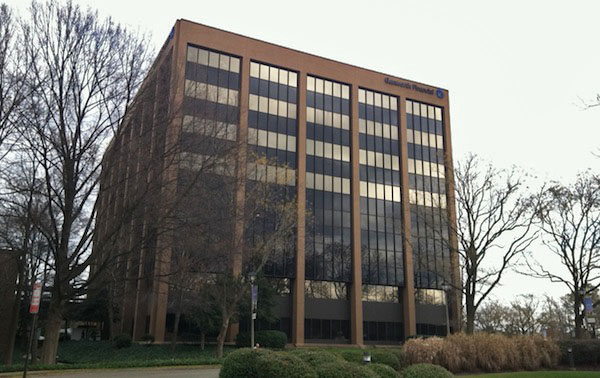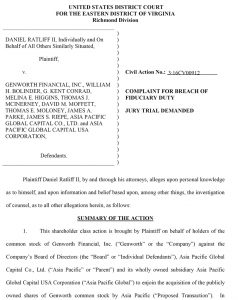The class action bug has hit Henrico-based insurance giant Genworth Financial for the second time this month, as yet another shareholder has sued to try to block the company’s pending deal to be acquired and taken private by a Chinese conglomerate.
The latest case, filed Nov. 14 in Richmond federal court with shareholder and Virginia resident Daniel Ratliff II as lead plaintiff, makes nearly identical assertions as the first lawsuit that was filed two weeks prior: claiming breaches of fiduciary duty against company and its board of directors, and arguing that the deal won’t result in the best value for Genworth shareholders.
The Ratliff case follows a Nov. 2 suit filed by Genworth shareholder Harold Faverman as the lead plaintiff. That case was subsequently dismissed voluntarily by Faverman three days after the Ratliff filing. A reason for the withdrawal was not given in court records.
Like its predecessor, Ratliff’s suit seeks class action status on behalf of all Genworth shareholders and to either block the company’s pending $2.7 billion acquisition by China Oceanwide or win damages should the transaction be completed.
The new case names the same defendants, which in addition to the company itself, includes members of its board of directors and Genworth CEO Thomas McInerney.
It argues that the deal is not in shareholders’ best interests based on the per-share offer and provisions preventing the company from pursuing other suitors.
The suit points to China Oceanwide’s offer to pay $5.43 in cash per share for Genworth common stock as being a premium of “only” $0.22 per share, based on the closing price the last trading day before the deal was announced.
The case also argues “preclusive deal protection measures” are preventing the company from freely shopping around for better offers. That includes a “whopping $104 million termination fee” to be paid by Genworth should it decide to back out of the deal.
“The board has hamstrung its ability to consider competing, better offers,” Ratliff’s case claims. “In sum, the proposed transaction is the product of the individual defendants’ failure to fulfill their fiduciary duty to maximize stockholder value and to structure a deal that will ensure stockholders receive the highest possible amount for their shares.”
Announced Oct. 23, the deal with China Oceanwide would pay the $5.43 per share price in cash, plus an additional $1 billion in cash to be pumped into Genworth to batten down its life insurance business and handle debt that’s due in 2018.
Genworth, headquartered off West Broad Street, has said the deal is the best alternative for shareholders to combat challenges the company is facing, the most pressing of which is massive losses in its long-term care insurance division.
Ratliff is represented in his case by attorney Charles Williams of Richmond law firm Williams & Skilling. He asks for a jury trial and for the court to certify the case as a class action suit.
As for the size of the potential class, the suit doesn’t say how many public Genworth shareholders exist, but states there are 498 million shares outstanding.
Such shareholder class action lawsuits have become the new norm in the wake of big merger announcements involving public companies. They are often spurred by law firms from around the country that hunt for lead plaintiffs willing to put their name on a suit.
The practice has become some common that many companies plan for and include the related legal expenses in their budgets and deal calculations.
Other defendants in the Ratliff case are Asia Pacific Global Capital Co. and Asia Pacific Global Capital USA Corp., entities used by China Oceanwide in the acquisition. The suit claims the Asia Pacific firms aided and abetted the Genworth’s board of directors in their alleged breaches of fiduciary duty.
Genworth said earlier this month it does not comment on litigation issues.
The class action bug has hit Henrico-based insurance giant Genworth Financial for the second time this month, as yet another shareholder has sued to try to block the company’s pending deal to be acquired and taken private by a Chinese conglomerate.
The latest case, filed Nov. 14 in Richmond federal court with shareholder and Virginia resident Daniel Ratliff II as lead plaintiff, makes nearly identical assertions as the first lawsuit that was filed two weeks prior: claiming breaches of fiduciary duty against company and its board of directors, and arguing that the deal won’t result in the best value for Genworth shareholders.
The Ratliff case follows a Nov. 2 suit filed by Genworth shareholder Harold Faverman as the lead plaintiff. That case was subsequently dismissed voluntarily by Faverman three days after the Ratliff filing. A reason for the withdrawal was not given in court records.
Like its predecessor, Ratliff’s suit seeks class action status on behalf of all Genworth shareholders and to either block the company’s pending $2.7 billion acquisition by China Oceanwide or win damages should the transaction be completed.
The new case names the same defendants, which in addition to the company itself, includes members of its board of directors and Genworth CEO Thomas McInerney.
It argues that the deal is not in shareholders’ best interests based on the per-share offer and provisions preventing the company from pursuing other suitors.
The suit points to China Oceanwide’s offer to pay $5.43 in cash per share for Genworth common stock as being a premium of “only” $0.22 per share, based on the closing price the last trading day before the deal was announced.
The case also argues “preclusive deal protection measures” are preventing the company from freely shopping around for better offers. That includes a “whopping $104 million termination fee” to be paid by Genworth should it decide to back out of the deal.
“The board has hamstrung its ability to consider competing, better offers,” Ratliff’s case claims. “In sum, the proposed transaction is the product of the individual defendants’ failure to fulfill their fiduciary duty to maximize stockholder value and to structure a deal that will ensure stockholders receive the highest possible amount for their shares.”
Announced Oct. 23, the deal with China Oceanwide would pay the $5.43 per share price in cash, plus an additional $1 billion in cash to be pumped into Genworth to batten down its life insurance business and handle debt that’s due in 2018.
Genworth, headquartered off West Broad Street, has said the deal is the best alternative for shareholders to combat challenges the company is facing, the most pressing of which is massive losses in its long-term care insurance division.
Ratliff is represented in his case by attorney Charles Williams of Richmond law firm Williams & Skilling. He asks for a jury trial and for the court to certify the case as a class action suit.
As for the size of the potential class, the suit doesn’t say how many public Genworth shareholders exist, but states there are 498 million shares outstanding.
Such shareholder class action lawsuits have become the new norm in the wake of big merger announcements involving public companies. They are often spurred by law firms from around the country that hunt for lead plaintiffs willing to put their name on a suit.
The practice has become some common that many companies plan for and include the related legal expenses in their budgets and deal calculations.
Other defendants in the Ratliff case are Asia Pacific Global Capital Co. and Asia Pacific Global Capital USA Corp., entities used by China Oceanwide in the acquisition. The suit claims the Asia Pacific firms aided and abetted the Genworth’s board of directors in their alleged breaches of fiduciary duty.
Genworth said earlier this month it does not comment on litigation issues.

